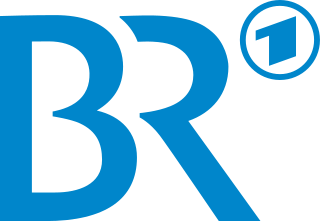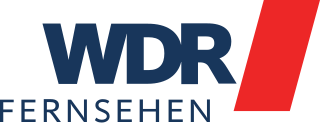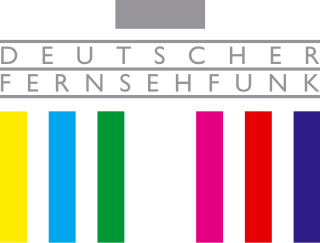Public broadcasting involves radio, television, and other electronic media outlets whose primary mission is public service. Public broadcasters receive funding from diverse sources including license fees, individual contributions, public financing, and commercial financing, and avoid political interference or commercial influence.
MEGA Channel, also known as MEGA TV or just MEGA, is a television network in Greece, that broadcasts a mix of foreign and Greek programming. It is the first and the oldest private television network in Greece.
The Radio-télévision belge de la Communauté française, shortened to RTBF, is a public service broadcaster delivering radio and television services to the French-speaking Community of Belgium, in Wallonia and Brussels. Its counterpart in the Flemish Community is the Dutch-language VRT, and in the German-speaking Community it is BRF.

ARD is a joint organisation of Germany's regional public-service broadcasters. It was founded in 1950 in West Germany to represent the common interests of the new, decentralised, post-war broadcasting services – in particular the introduction of a joint television network.
Das Erste is the flagship national television channel of the ARD association of public broadcasting corporations in Germany. Das Erste is jointly operated by the nine regional public broadcasting corporations that are members of the ARD.

TV5Monde, formerly known as TV5, is a French public television network, broadcasting several channels of French-language programming. It is an approved participant member of the European Broadcasting Union.
Westdeutscher Rundfunk Köln, shortened to WDR, is a German public-broadcasting institution based in the Federal State of North Rhine-Westphalia with its main office in Cologne. WDR is a constituent member of the consortium of German public-broadcasting institutions, ARD. As well as contributing to the output of the national television channel Das Erste, WDR produces the regional television service WDR Fernsehen and six regional radio networks.

The Swiss Broadcasting Corporation is the Swiss public broadcasting association, founded in 1931, the holding company of 24 radio and television channels. Headquartered in Bern, the Swiss Broadcasting Corporation is a non-profit organisation, funded mainly through radio and television licence fees (79%) and making the remaining income from advertising and sponsorship.
Deutschlandfunk is a public-broadcasting radio station in Germany, concentrating on news and current affairs. It is one of the four national radio channels produced by Deutschlandradio.

Bayerischer Rundfunk, shortened to BR, is a public-service radio and television broadcaster, based in Munich, capital city of the Free State of Bavaria in Germany. BR is a member organization of the ARD consortium of public broadcasters in Germany.
Television in Germany began in Berlin on 22 March 1935, broadcasting for 90 minutes three times a week. It was home to the first regular television service in the world, named Fernsehsender Paul Nipkow.
Belgischer Rundfunk (BRF) is the public-service broadcasting organisation serving the German-speaking Community of Belgium. Based in Eupen, with additional studio facilities in Sankt Vith and Brussels, BRF produces one television and three radio channels.

WDR Fernsehen is a German free-to-air television network owned and operated by Westdeutscher Rundfunk and serving North Rhine-Westphalia. It is one of the seven regional "third programmes" television stations that are offered within the federal ARD network.

Tipik is a Belgian national television channel, owned and operated by the French-language public-service broadcasting organization RTBF.
Television in Belgium was introduced in 1953 and began with one channel each in Dutch and French. The country is heavily cabled, with 93% of households watching television through cable as of 2003.

SRF info is a German-language Swiss television channel owned by Schweizer Radio und Fernsehen. The channel started trial broadcasts in May 1999 and regular broadcasts in January 2001.

Deutscher Fernsehfunk was the state television broadcaster in the German Democratic Republic from 1952 to 1991.
Television in Switzerland was introduced in 1950, with regular broadcasts commencing in 1953. People who live in Switzerland are required by law to pay a television licence fee, which is used to finance the public radio and television service SRG SSR. Since 1 January 2021, the Licence fee cost in all the linguistic regions of Switzerland is 335 CHF per year or 83.75 CHF quarterly, counting both radio and television licences. All licence fee payers are entitled under the law to services of equal quality. The fee is charged per household and not per person, with empty dwellings being exempt. The fee is determined by the Federal Council.

hr-fernsehen is the regional television channel of Hessischer Rundfunk for the state of Hesse, Germany.
The mass media in Belgium is characterized by its diversity due to the linguistic divide in the country.










